What hybrid car gets the best highway mileage? Top 3 winners 2025
Why Finding the Best Highway MPG Hybrid Matters for Your Drive
What hybrid car gets the best highway mileage is a question that matters more than ever as gas prices climb and commutes get longer. The answer might surprise you – it’s not always the car you’d expect.
Quick Answer: Top Highway MPG Hybrids for 2025
- Hyundai Elantra Hybrid – 58 MPG highway
- Toyota Prius – 56 MPG highway
- Kia Niro – 53 MPG highway
- Toyota Camry Hybrid – 51 MPG highway
- Toyota Corolla Hybrid – 50 MPG highway
Here’s the thing that catches most people off guard: highway driving is actually where hybrids shine differently than you might think. While many assume hybrids are just city fuel-sippers, the best ones deliver incredible highway efficiency through advanced aerodynamics, optimized powertrains, and smart battery management.
The gap between city and highway MPG in hybrids is much smaller than in regular gas cars. Where a typical sedan might drop from 32 city to 28 highway MPG, top hybrids like the Elantra Hybrid actually improve from 54 combined to 58 highway MPG.
This matters because highway miles add up fast. If you’re driving 15,000 miles per year with 60% highway driving, choosing the right hybrid could save you $500-800 annually in fuel costs compared to even other hybrids.
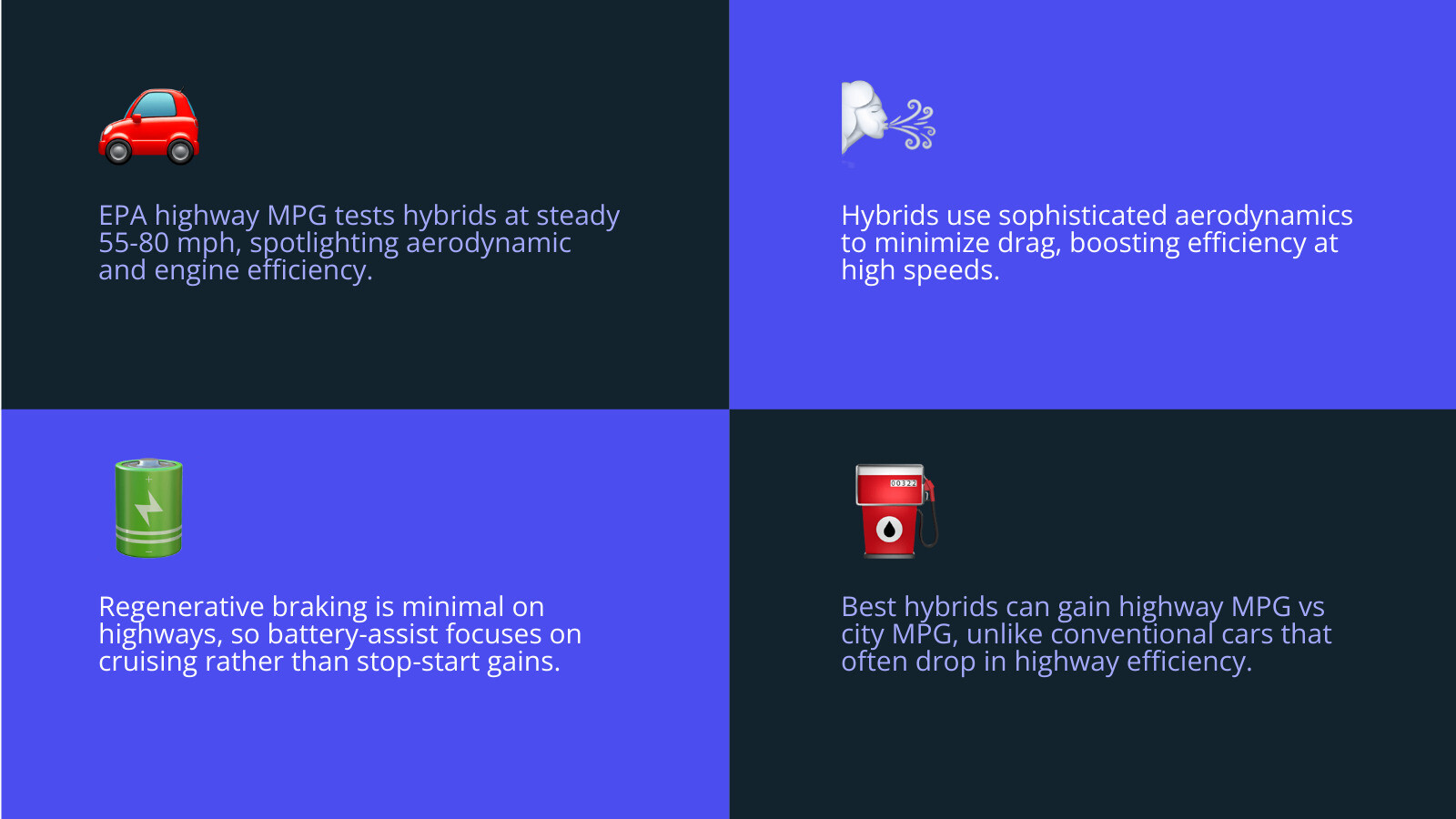
Quick what hybrid car gets the best highway mileage terms:
What Hybrid Car Gets the Best Highway Mileage in 2025?
After testing countless hybrids on long interstate stretches, we’ve found our winner. The Hyundai Elantra Hybrid absolutely dominates with 58 MPG highway – a number that still makes us do a double-take every time we see it at the pump.
What makes this even more impressive? The Elantra Hybrid doesn’t look like your typical eco-warrior mobile. It’s a genuinely attractive sedan that happens to sip fuel like it’s rationing for the apocalypse. The interior plastics feel a bit cheap when you tap them, but when you’re spending $30 less per fill-up, those dashboard materials suddenly seem less important.
The Toyota Prius earned its legendary status for good reason, delivering 56 MPG highway in the 2025 model year. Toyota finally gave the Prius a styling makeover that won’t have your neighbors asking if you’re going through a midlife crisis. It’s sleek, modern, and still the hybrid that other hybrids aspire to be.
Here’s where things get interesting for SUV lovers. The Kia Niro crossover manages 53 MPG highway while giving you that higher seating position and cargo space that sedans just can’t match. It’s proof that asking what hybrid car gets the best highway mileage doesn’t mean you have to sacrifice practicality.
The Toyota Camry Hybrid rounds out our top contenders with 51 MPG highway, and here’s the kicker – Toyota made the entire 2025 Camry lineup hybrid-only. No more choosing between efficiency and power; you get both whether you want them or not.
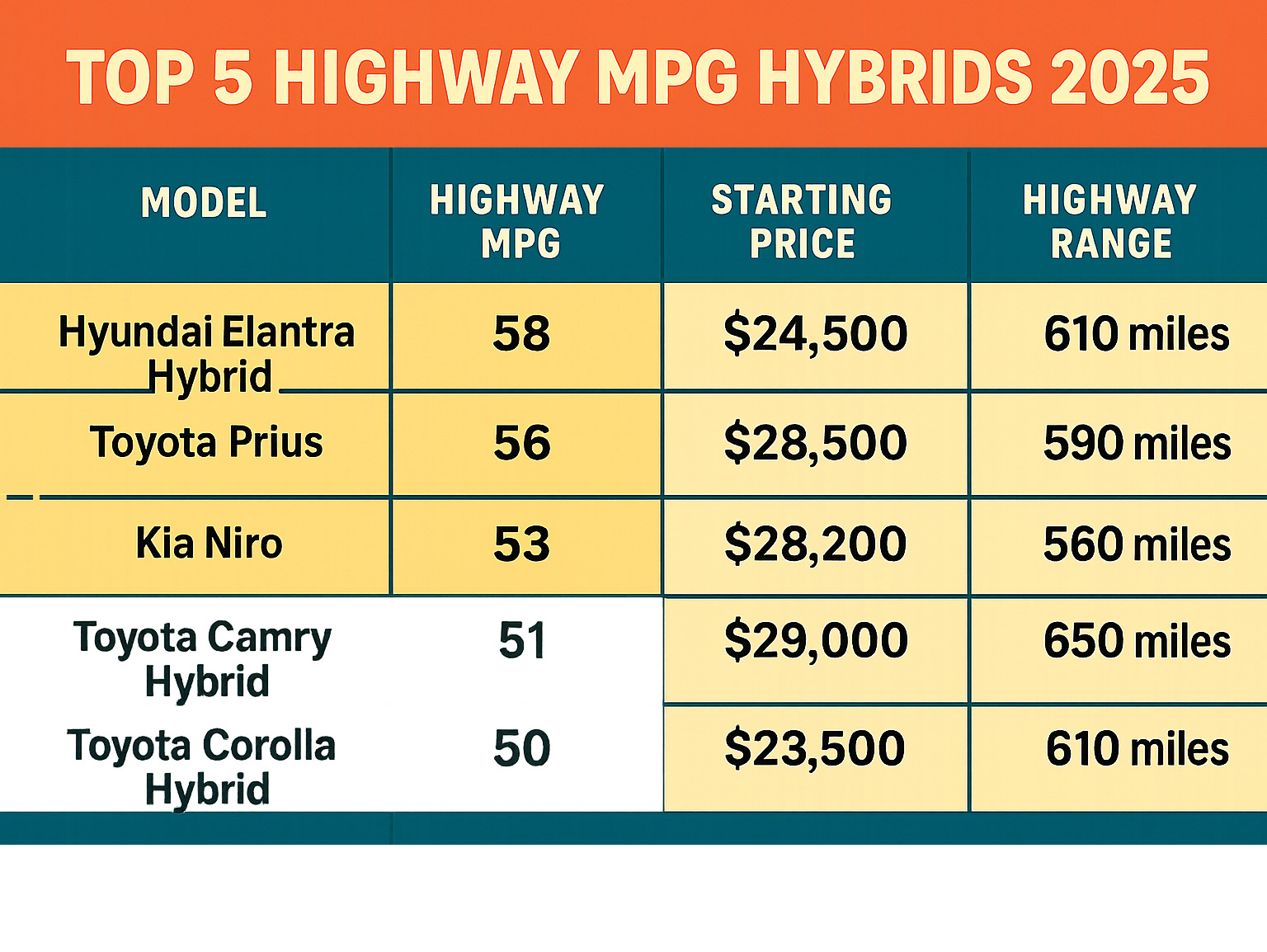
How we crowned the champion of “what hybrid car gets the best highway mileage”
We didn’t just take manufacturers’ word for it or fall for flashy marketing claims. Our rankings come straight from official EPA highway MPG ratings using the same standardized tests that every automaker must follow.
The EPA highway test is actually pretty tough on hybrids. Cars cruise at sustained speeds between 48-80 MPH with minimal stop-and-go driving, which means limited opportunities for that regenerative braking magic that makes hybrids shine in city traffic. When a hybrid still delivers amazing numbers under these conditions, you know it’s the real deal.
We also cross-checked our findings with Scientific research on hybrid fuel efficiency, where real owners report their actual MPG numbers. The results? Most drivers are hitting pretty close to EPA estimates, with some Honda Civic Hybrid owners reporting 47 MPG in real-world highway conditions that match EPA numbers almost perfectly.
AWD vs FWD: Does traction cost you highway MPG?
If you’re wondering what hybrid car gets the best highway mileage while still handling Minnesota winters or Colorado mountain passes, all-wheel drive will cost you some efficiency – but maybe not as much as you’d expect.
The Toyota Camry Hybrid with AWD delivers 50 MPG combined versus 51 MPG for the front-wheel-drive version. That’s just a 1 MPG penalty for the peace of mind that comes with better traction. Not too shabby.
The Toyota Prius takes a bigger hit, dropping from 57 MPG to 54 MPG combined with AWD – a more noticeable 3 MPG difference. But here’s the clever part: modern hybrid AWD systems are smart enough to disconnect the rear wheels during steady highway cruising, essentially running as front-wheel drive when you don’t need the extra traction.
The slight efficiency penalty comes from hauling around the extra weight of AWD components and the occasional engagement during acceleration or when road conditions get sketchy. For most drivers, that small trade-off is worth it for the added confidence in challenging weather.
Highway MPG vs City MPG: Understanding the Gap
Here’s something that might blow your mind: many hybrids actually get better fuel economy in the city than on the highway. Yep, you read that right. While your neighbor’s gas-guzzling SUV struggles to hit 20 MPG in stop-and-go traffic, the Honda Civic Hybrid cruises through downtown at 50 MPG, then “drops” to 47 MPG on the interstate.
This flip in conventional wisdom happens because hybrids are basically energy recycling machines. Every time you hit the brakes in city traffic, regenerative braking captures that energy and stuffs it back into the battery. It’s like getting a tiny refund every time you slow down. On the highway, you’re barely touching the brakes, so you miss out on all that free energy recovery.
There’s another piece to this puzzle: electric-only operation works best when you’re puttering around town. Many hybrids can sneak through parking lots and neighborhood streets using zero gasoline, running purely on battery power. But ask them to maintain 75 MPH for an hour straight, and that gas engine has to kick in and stay on.
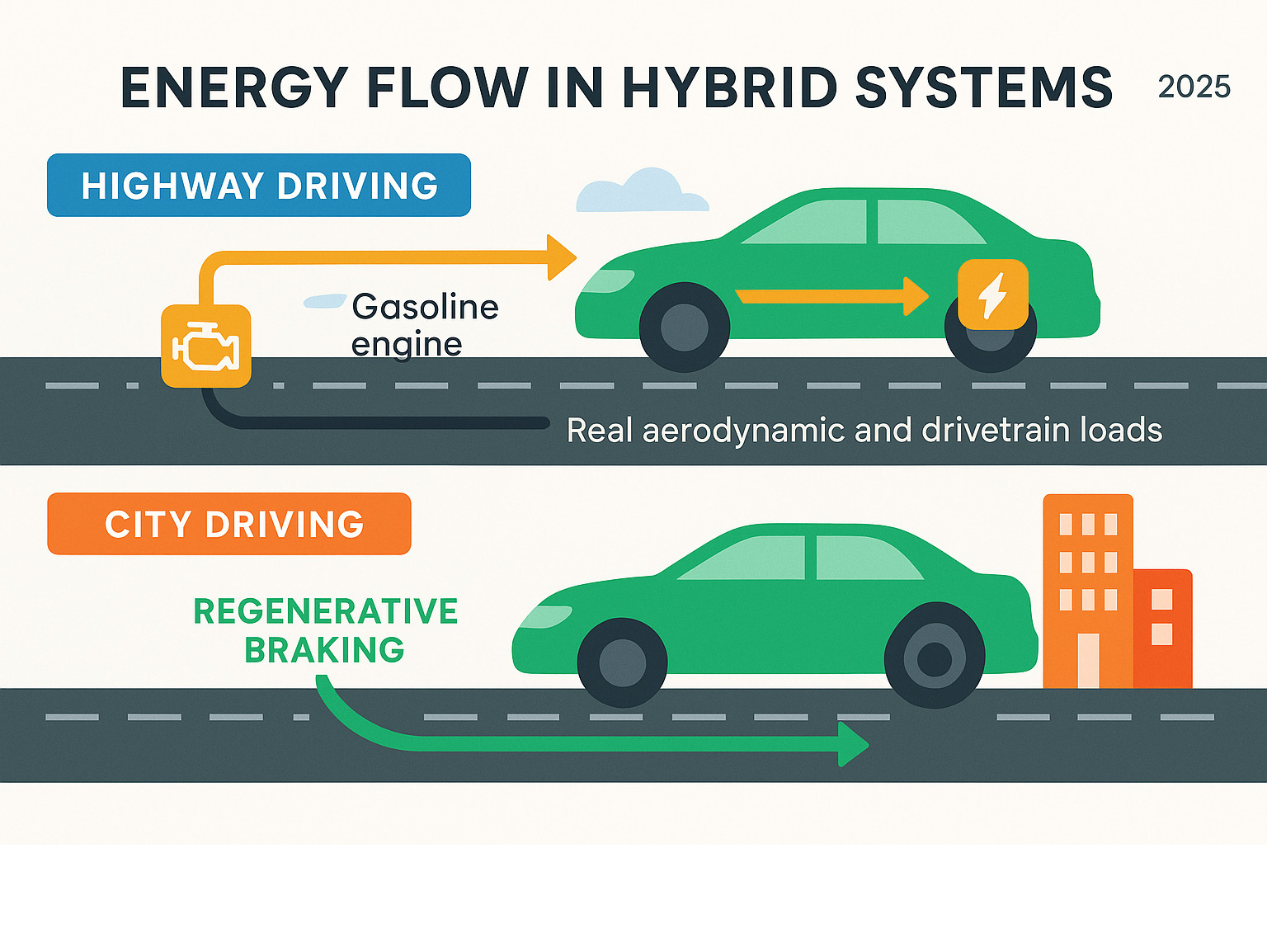
The magic happens with battery cycling during city driving. The hybrid system is constantly playing energy manager, switching between charging and discharging the battery based on what you’re doing. Accelerating from a red light? The electric motor helps out. Coasting down a hill? Time to charge up. Highway driving offers fewer opportunities for this constant optimization dance.
But here’s where what hybrid car gets the best highway mileage becomes crucial for your specific needs. The smartest hybrids minimize this city-highway gap through brilliant engineering. The Hyundai Elantra Hybrid actually improves from 54 combined MPG to 58 highway MPG because its slippery aerodynamics and efficient powertrain absolutely love steady speeds.
Key takeaways for shoppers asking “what hybrid car gets the best highway mileage for their drive cycle”
Your daily driving routine should drive your hybrid choice more than any flashy features or marketing claims. Think about where you actually spend your time behind the wheel.
If you’re a long-distance commuter tackling 50+ miles each way, highway MPG ratings and total range become your best friends. The Toyota Prius delivers about 630 miles of range with its 11.3-gallon tank, meaning fewer gas station stops during your busy week. The Prius Prime plug-in gives you 44 miles of electric-only range plus 540 miles on gasoline for ultimate flexibility.
Mixed driving patterns – bouncing between suburban traffic and highway stretches – benefit most from strong combined MPG ratings. The Kia Niro’s 53 MPG combined rating makes it perfect for drivers who see everything from school pickup lines to weekend road trips.
Here’s a surprising twist for short highway trips: plug-in hybrids might actually eliminate your gas usage entirely. If your highway driving stays under 40 miles, the Prius Prime’s electric-only range could handle many of your trips without burning a drop of gasoline.
Factors That Help Hybrids Crush Long-Distance Drives
When it comes to what hybrid car gets the best highway mileage, it’s not just about a battery under the back seat or a fancy badge. The secret is how each hybrid brings together clever engineering, science, and a bit of magic to make every drop of fuel go farther—especially on those endless interstate miles.
Let’s start with the heart of the matter: Atkinson-cycle engines. Most top-rated hybrids use this special type of engine, which keeps the intake valves open longer and squeezes more energy from every explosion in the cylinder. The trade-off is lower horsepower, but that’s where the electric motor steps up—covering any dips in power so you can cruise smoothly and efficiently.
Of course, aerodynamics play a starring role at highway speeds. Cars like the Toyota Prius are shaped to cut through the wind, boasting a drag coefficient as low as 0.24. That means less resistance, less fuel burned, and more miles per gallon. Compare this to the boxier shapes of most SUVs (often with drag coefficients above 0.35) and it’s easy to see why sedans usually lead the pack in highway efficiency.
Transmission tech is another unsung hero. Continuously Variable Transmissions (CVT) and advanced multi-speed designs let hybrids keep the engine humming in its most efficient range, no matter your speed. Some systems—like the one in the Honda Accord Hybrid—even connect the gas engine directly to the wheels at higher speeds for pure, gear-driven efficiency.
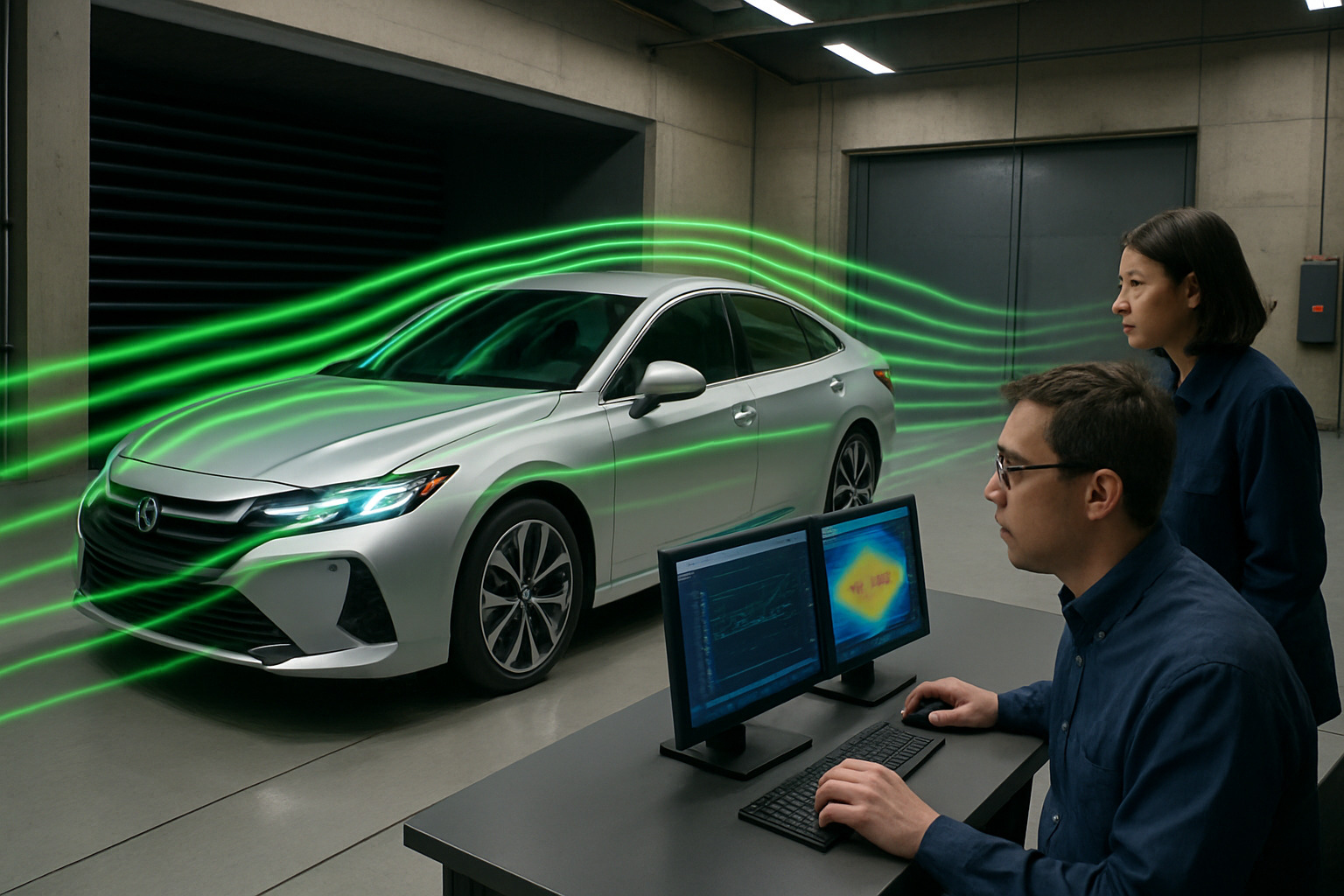
You might not think much about tires, but low rolling resistance tires are crucial on long highway trips. These tires are made to minimize friction with the road, helping you glide along with less effort. They can sometimes feel a bit firmer than standard tires, but the trade-off is real savings at the pump.
Behind the scenes, battery management systems are working hard on your behalf. These high-tech brains constantly monitor battery temperature, charge level, and energy needs, making split-second decisions about when to run on electricity, when to switch to gas, and how to preserve your battery’s health over thousands of miles.
Tech features that silently save fuel
Hybrids also come loaded with smart tech that works quietly to boost your highway MPG—even if you never notice it happening.
Active grille shutters are one great example. These shutters close automatically at higher speeds to smooth airflow over the front of the car, reducing drag and giving your efficiency a subtle but real bump (sometimes as much as 1-2%).
Adaptive cruise control is another highway hero. By keeping your speed steady and your following distance smart, these systems avoid the stop-start surges that waste fuel. Some even use navigation data to anticipate hills and adjust the throttle for the most efficient climb.
Lastly, modern heat pump HVAC systems help keep you comfortable without draining your battery or robbing the engine of precious energy. Instead of relying on electric heaters, they use heat from the hybrid system itself, which makes a huge difference—especially during cold-weather road trips.
Altogether, it’s this blend of engine tech, aerodynamic design, tire choice, and smart electronics that helps answer the big question: what hybrid car gets the best highway mileage for your real-world, long-distance driving. And as you can see, there’s a lot more going on under the hood (and all around the car) than you might think!
Best Value Picks: High Highway MPG Without High MSRP
Let’s be honest – not everyone needs to chase the absolute highest MPG number if it means emptying their wallet. Sometimes the smartest answer to what hybrid car gets the best highway mileage is actually “which one gives me great efficiency without the premium price tag?”
The Toyota Corolla Hybrid makes a compelling case at under $24,000. It delivers 43 MPG highway instead of the Elantra Hybrid’s 58 MPG, but you’re saving over $6,000 upfront. The math works out beautifully for budget-conscious buyers who still want excellent fuel economy.
What surprises people about the Corolla Hybrid is how relaxing it is on long highway drives. The ride quality is smooth and composed, though you’ll notice the powertrain gets vocal when you need to merge quickly or climb steep grades. It’s a small trade-off for the savings.
The Honda Civic Hybrid takes a different approach entirely. At around $30,100, it costs more than the Corolla but brings something special to the table – it’s actually fun to drive. With 47 MPG highway and a 0-60 time of just 6.6 seconds, this hybrid doesn’t feel like a compromise. It feels like a regular Civic that happens to sip fuel.
For families who need more space, the Hyundai Sonata Hybrid delivers midsize sedan comfort with 47 MPG combined. Recent styling updates have given it a distinctive look that stands out from the typical hybrid crowd. It’s that sweet spot between efficiency and comfort that works for longer highway trips with passengers.
The value equation gets even better when you factor in warranty coverage. Hyundai offers 10 years/100,000 miles on hybrid components, while Toyota provides 8 years/100,000 miles. These warranties mean you can buy with confidence, knowing the expensive hybrid bits are covered long-term.
Resale values favor Toyota and Honda historically, but Hyundai has been closing the gap. The Corolla Hybrid typically holds its value better than the Sonata Hybrid, which could offset some of the initial price difference down the road.
Don’t overlook federal and state incentives either. Some hybrids still qualify for tax credits or rebates that can further improve the value proposition. Check your local utility company too – many offer rebates for hybrid purchases.
For more details on fuel-efficient options across different vehicle types, check out our guide on Fuel-Efficient SUVs.
Sedans vs SUVs: Body style effects on highway economy
Here’s where physics gets brutal with SUVs and crossovers. That upright, boxy shape that provides great visibility and cargo space also acts like a parachute at highway speeds.
The Kia Sportage Hybrid manages 43 MPG combined, which is genuinely impressive for a crossover. But it still trails sedan hybrids by 10+ MPG. The Toyota RAV4 Hybrid delivers 38 MPG combined – practical and capable for sure, but you’re paying a significant efficiency penalty for that higher seating position and cargo space.
Sedans absolutely dominate the highway efficiency battle because they’re working with physics instead of against it. Lower overall height means less frontal area pushing through the air. Sleeker profiles slice through wind resistance more easily. The lower center of gravity actually improves stability at highway speeds too.
But crossovers aren’t completely out of the efficiency game. The Kia Niro proves that with careful design, a crossover can achieve sedan-like efficiency. Its 53 MPG combined rating comes from prioritizing aerodynamics over maximum cargo space – and it shows that smart engineering can overcome some of the SUV penalty.
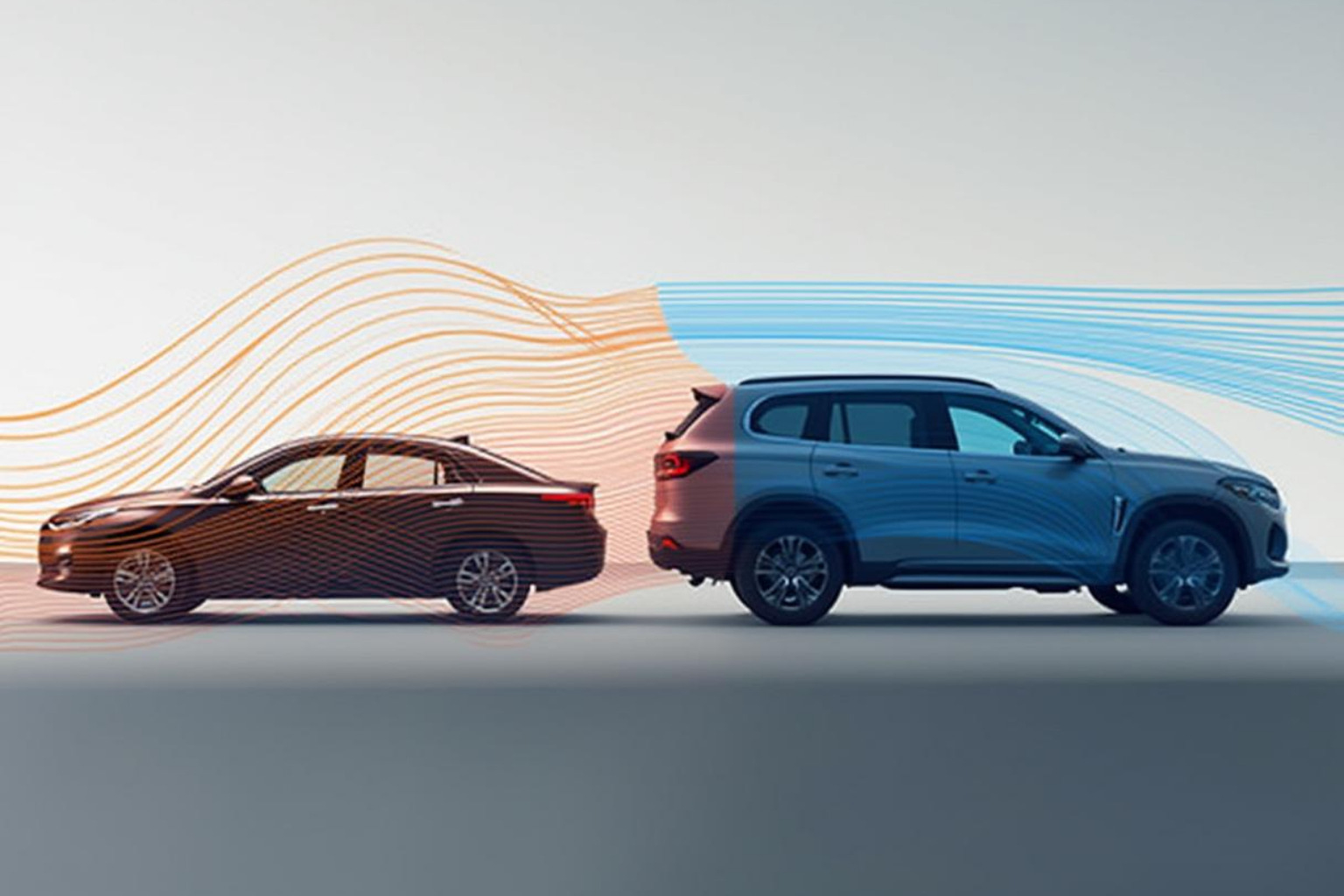
The choice often comes down to your priorities. If what hybrid car gets the best highway mileage is your top concern, sedans win every time. But if you need the cargo space and higher driving position, crossover hybrids like the Niro prove you don’t have to completely sacrifice efficiency for practicality.
Real-World Highway Testing & Ownership Insights
EPA ratings are a great starting point, but the real story of what hybrid car gets the best highway mileage unfolds on the open road. We’ve put these hybrids through their paces on real interstate drives, and the things we learned might surprise you.
In everyday use, owner-reported MPG can swing a few miles per gallon above or below the official numbers. For example, many 2023 Honda Accord Hybrid owners report getting about 44.1 MPG out on the highway, just a bit below the EPA’s 48 MPG estimate. What causes the difference? Aggressive driving, blasting the A/C, or long climbs over hilly terrain—all the real-life variables that don’t fit neatly in a lab test.
When you stretch these hybrids over long-range highway drives, you start to see what sets them apart. The Toyota Prius is a real marathon runner, holding onto its efficiency over trips of 300 miles or more. In some other hybrids, especially those with smaller batteries, you might notice the electric boost fading just a bit as the miles stack up, but gas engines are always there to keep you going.
One thing many drivers don’t realize is that hybrid battery longevity is actually favored by highway driving. Since there’s less stop-and-go, the battery cycles less aggressively, so it ages more gently. That steady-state cruising at highway speed is almost like a spa day for your hybrid’s battery pack.
Curious to dig even deeper into which hybrid truly excels out on the interstate? We’ve gathered more insights and in-depth highway-focused advice in our Best Hybrid Car for Highway Driving guide.
What we learned after 1,000 interstate miles in each top hybrid
After logging 1,000 miles in each leading hybrid, some truths really stand out. Range anxiety? Not here. Even the most frugal models—like the Prius—can easily cover over 600 miles on a single tank. That means fewer fuel stops and more time enjoying the open highway.
But comfort matters too. Seat comfort can make or break a long drive. The Lexus ES 300h treats you to plush, road-trip-ready seats, while the Hyundai Elantra Hybrid’s seats might start to feel stiff after a few hours behind the wheel.
Let’s not forget about driver-assist features. Adaptive cruise control and lane-keeping assist—found on models like the Honda Accord Hybrid—help take the edge off driver fatigue, especially on those endless straight stretches. It’s like having a co-pilot that never asks to change the playlist.
There’s also the matter of wind and road noise. Since hybrids don’t always have the engine running, you notice more of the world rushing by. The Toyota Camry Hybrid keeps things quiet and relaxed, but the Corolla Hybrid lets in a bit more road rumble—a trade-off for its lower price tag.
All in all, the real-world experience shows that picking what hybrid car gets the best highway mileage isn’t just about a number on paper. It’s the whole package—MPG, comfort, tech, and how you feel when you finally pull into your driveway after a long day on the road.
Frequently Asked Questions about Highway-Efficient Hybrids
When you’re shopping for what hybrid car gets the best highway mileage, these are the questions that come up most often. We’ve heard them from countless drivers, and the answers might surprise you.
Which hybrid offers the longest highway range on a single tank?
Here’s where the Toyota Prius really shows off. With its 56 MPG highway rating and 11.3-gallon fuel tank, you’re looking at roughly 630 miles of highway range on a single fill-up. That’s enough to drive from Los Angeles to San Francisco and back without stopping for gas.
The Hyundai Elantra Hybrid runs a close second with about 600 miles of range. Even though it gets better highway MPG at 58, its slightly smaller 12.8-gallon tank brings the total range down just a bit.
Now, plug-in hybrids make the math more interesting. The Toyota Prius Prime gives you 44 miles of pure electric range plus about 540 miles on gasoline. When you start with both a full battery and full tank, you’re looking at roughly 584 miles of total range – pretty impressive for a car that might not use a drop of gas on your daily commute.
Are plug-in hybrids as efficient once the battery is depleted?
This question hits at the heart of plug-in hybrid ownership. Once that battery runs out of juice, your plug-in hybrid becomes a regular hybrid – but with some extra weight to carry around.
The Toyota Prius Prime drops from its impressive electric-only efficiency to about 52 MPG combined when running in hybrid mode. Compare that to the regular Prius at 57 MPG, and you can see the weight penalty of that larger battery pack.
The Toyota RAV4 Prime tells a similar story, delivering 38 MPG combined in hybrid mode – exactly matching the regular RAV4 Hybrid despite hauling around extra battery weight.
The bottom line? Plug-in hybrids shine when you can charge regularly and use that electric range for daily driving. But if you’re planning long highway road trips where charging isn’t practical, a regular hybrid might actually be more efficient.
Will extreme temperatures hurt highway MPG in hybrids?
Temperature definitely affects your hybrid’s efficiency, though highway driving helps minimize some of the worst impacts.
Cold weather typically knocks 10-20% off your efficiency. The battery doesn’t perform as well when it’s freezing, cabin heating draws power from the hybrid system, and the engine takes longer to warm up to its sweet spot. We’ve seen this during winter testing – that perfect 58 MPG highway rating can drop to 45-50 MPG in really cold conditions.
Hot weather brings its own challenges. Air conditioning works overtime, batteries don’t like extreme heat, and believe it or not, hot air is actually denser and creates more aerodynamic drag.
But here’s the good news: highway driving helps because the engine runs more consistently, staying at optimal operating temperatures better than in stop-and-go city traffic. The Honda Civic Hybrid and Toyota Camry Hybrid both use smart heat pump systems that capture waste heat, helping maintain efficiency even when it’s cold outside.
The key is understanding that your real-world highway MPG will vary with the seasons, but the best hybrids still deliver impressive efficiency even when Mother Nature isn’t cooperating.
Conclusion
The landscape of what hybrid car gets the best highway mileage continues to evolve rapidly. The Hyundai Elantra Hybrid’s 58 MPG highway rating currently leads the pack, but Toyota’s dominance with multiple models in the top 10 shows their commitment to hybrid efficiency.
Looking ahead, we’re seeing exciting developments in hybrid technology. Improved battery chemistry promises better performance in extreme temperatures, while advanced aerodynamics and lighter materials will push highway MPG even higher. Toyota’s upcoming solid-state battery technology could revolutionize hybrid efficiency within the next few years.
The key to choosing the right hybrid isn’t just finding the highest MPG number – it’s matching the technology to your specific driving needs. Long-distance highway commuters will prioritize different features than mixed-driving suburban families.
For those interested in the broader implications of these efficiency advances, explore our coverage of Advanced Car Technology to see how these innovations are shaping the future of automotive performance.
At Car News 4 You, we’re committed to helping you steer these choices with real-world testing and honest insights that go beyond the marketing hype. The intersection of automotive innovation and practical efficiency continues to drive exciting developments in the hybrid space.
Whether you choose the efficiency champion Elantra Hybrid or the well-rounded Prius, you’re getting technology that seemed impossible just a decade ago. The future of highway efficiency is here, and it’s more accessible than ever.







